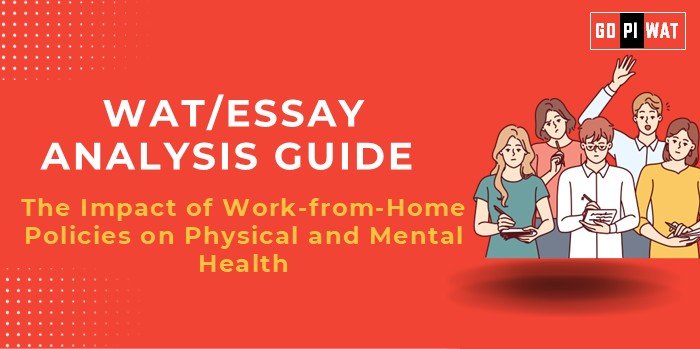📋 Written Ability Test (WAT)/Essay Analysis Guide
🖥️ Topic: The Impact of Work-from-Home Policies on Physical and Mental Health
🌟 Understanding the Topic’s Importance
Work-from-home (WFH) policies represent a critical topic in management studies, bridging HR strategies with mental health and productivity concerns. This discussion aligns with broader trends in sustainable and flexible work practices.
⏳ Effective Planning and Writing
- Time Allocation:
- Planning: 5 minutes
- Writing: 20 minutes
- Review: 5 minutes
- Preparation Tips:
- Note key statistics on physical and mental health impacts.
- Understand stakeholder roles and their implications on policy decisions.
✍️ Introduction Techniques for Essays
- Contrast Approach:
- Solution-Based Introduction:
“While WFH offers flexibility and eliminates commutes, it has brought sedentary routines and mental health challenges to the forefront.”
“Remote work’s health implications demand innovative solutions like virtual fitness programs and flexible work hours.”
📑 Structuring the Essay Body
- Achievements: Highlight cost savings and inclusivity with supporting data, such as reduced commuting times and improved opportunities for differently-abled workers.
- Challenges with Comparative Analysis: Discuss burnout and obesity trends, referencing global responses like Japan’s ergonomic innovations and mental health programs in the US.
- Future Outlook: Suggest integrating hybrid work models and wellness technologies to support employees holistically.
🔗 Concluding Effectively
- Balanced Perspective:
- Global Comparison:
“WFH policies must evolve to balance flexibility with health considerations for sustainable productivity.”
“As seen in Japan and the US, integrating health resources into remote work policies can effectively address these challenges.”
📊 Analyzing Successes and Shortcomings
- Achievements: Cost efficiency, inclusivity, and employee autonomy.
- Challenges: Rising health issues, work-life imbalance, and difficulty maintaining engagement.
- Global Context: Innovations in ergonomics and hybrid models from leading organizations worldwide.
🔧 Recommendations for Sustainable Progress
- Develop hybrid work models that integrate in-person collaboration with remote flexibility.
- Invest in employee wellness initiatives like virtual fitness programs and mental health resources.
- Encourage regular assessments of WFH policies to adapt to emerging health and productivity trends.
📄 Sample Short Essays on the Topic
- Balanced Perspective: “WFH policies bring flexibility and inclusivity but also health risks, necessitating hybrid approaches for sustainability.”
- Solution-Oriented: “Integrating health-focused initiatives into WFH can enhance productivity while mitigating mental and physical health challenges.”
- Global Comparison: “Learning from global leaders, WFH policies can combine flexibility with robust health support systems for long-term success.”


